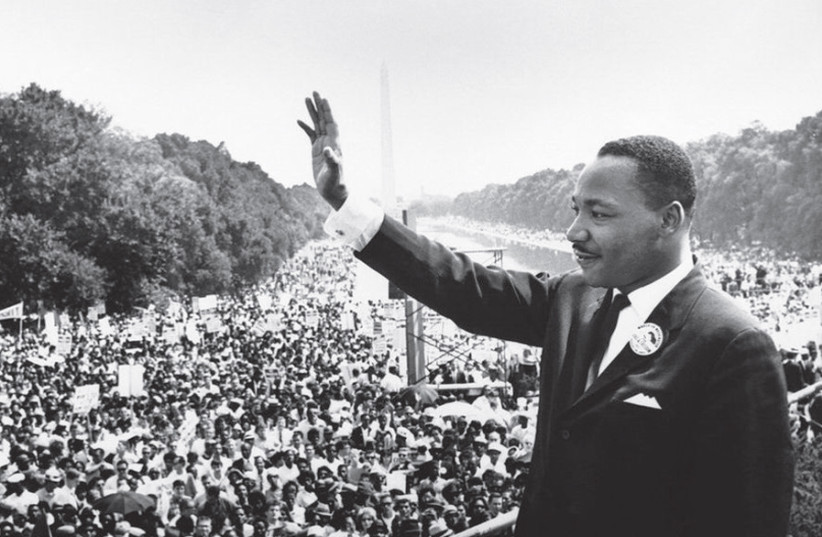The 60th anniversary of Martin Luther King Jr.’s March on Washington for Jobs and Freedom is a poignant reminder of the universal struggle for freedom and equality still being fought today, and of the courage and commitment of the human rights hero whose “I have a dream” speech has been immortalized.
I was moved to have been present in Washington on August 28, 1963, and the day’s images and voices left an indelible impact not only on my memory, but on my being.
The day itself was an incredible experience, as all those who were present can attest. Mahalia Jackson’s stirring spirituals – including “I Been ‘Buked and I’ve Been Scorned” – electrified the crowd, and her rendition of “We Shall Overcome” has become my own private anthem, as my family well knows.
A. Philip Randolph, the legendary Black labor union leader led the march, while emphasizing that racial justice was inextricably bound up with social justice, and he introduced Martin Luther King Jr. as the “greatest moral leader of our time.”
Legendary civil rights leader Bayard Rustin was the organizational genius behind the march, and his strategy of non-violent mass protest, in which he tutored King, has endured as a model for effective citizen advocacy to this day. Rustin’s equal justice “demands,” read out at the end of the march, remain a standard in the pursuit of justice today.

I recall, as well, congressman John R. Lewis – then a young 23-year-old Black student leader – chanting “Let Freedom Ring” while King’s speechwriter, Clarence Jones, told me that the famous “I have a dream” portion of King’s speech was actually improvised at the suggestion of Mahalia Jackson: “Tell ‘em about the dream, Martin,” she shouted out – a fact not apparent to those of us hanging on King’s every word.
I was a young law student of 23 and then-editor-in-chief of the McGill Daily (one of the oldest student newspapers in North America and in the Commonwealth) and had written about Martin Luther King and the civil rights struggle, earlier that year. I stood in the crowd of 250,000 people whom the Black man next to me referred to as “the brotherhood of humanity,” while humming “We Shall Overcome.”
The words of Martin Luther King Jr. still resonate
We all stood amid this brotherhood of humanity, rapt with attention as King told of his dream of an America in which his four little children would not be judged “by the color of their skin but by the content of their character”.
King spoke of the American Constitution as a promissory note. In his uniquely melodious and spiritual voice, he spoke movingly. Even 60 years later, Martin Luther King’s voice still resonates within me today.
“I have a dream that one day this nation will rise up and live out the true meaning of its creed: ‘We hold these truths to be self-evident: that all men are created equal.’”
“I have a dream that one day this nation will rise up and live out the true meaning of its creed: ‘We hold these truths to be self-evident: that all men are created equal.’”
Martin Luther King Jr.
King’s message was a universal one of common cause wherever we may be – of the struggle against racism, against hate, against injustice – and the struggle for human rights, for human dignity, respect, and recognition.
Indeed, Martin Luther King Jr. ought to be seen as the metaphor and the message of this struggle of his recognition that we are all one human family; that we have all been created in the image of God, and that this is the foundation of equality; that respect for the inherent dignity of the human being requires respect for the equal dignity and equal worth of all persons; that this is what human brotherhood is all about; that the struggle for human rights and human dignity, for equality and respect, are (in the most profound and existential sense) the struggle for ourselves. For in what we say – or more importantly, in what we do – we make a statement about ourselves as people.
On this 60th anniversary, let us recall, then, that Martin Luther King Jr. – like Nelson Mandela, who later invoked him – was the embodiment and expression of the long march towards freedom, of the great struggles of the 20th and 21st centuries for equality, for human dignity, for social justice and for the brotherhood of man.
King was the architect of the politics of inclusion, equality, respect, and recognition – not only for Black Americans; not only for America, but for all of humanity. As he expressed in his “Letter from a Birmingham jail,” also 60 years ago, in 1963 we must affirm and act upon.
“Injustice anywhere is a threat to justice everywhere.”
May this clarion call to action inspire us as we continue to strive toward realizing King’s vision in the next 60 years and beyond.
The writer is the international chair of The Raoul Wallenberg Centre for Human Rights; former justice minister and attorney-general of Canada and the first recipient in Canada of the Martin Luther King Jr. Humanitarian Award.
